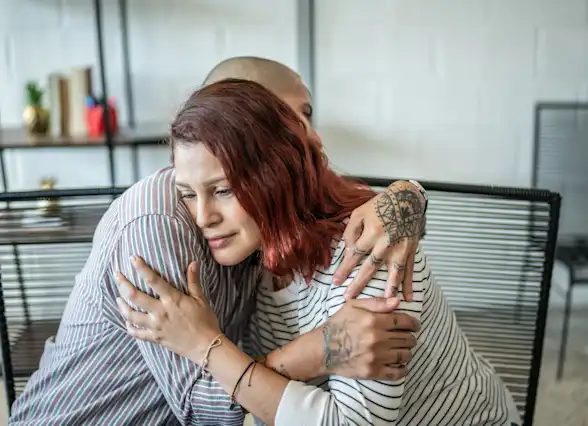Understanding Anxiety: When Worry Feels Too Big
Anxiety is something most of us feel at some point — before a big test, a job interview, or when we’re facing something unknown. But for some people, anxiety doesn’t go away after the stressor is gone. It can become loud, constant, or overwhelming, even when there’s no clear reason why.
Get insurance benefits, legal documents, and medical records in one place

😰 What Does Anxiety Feel Like?
Anxiety doesn’t always look like panic. Sometimes it looks like being on edge, exhausted, or frozen in place. It’s your brain and body trying to protect you — even when the danger isn’t real.
Common signs of anxiety include:
Feeling restless, jittery, or like something bad is about to happen
Trouble sleeping or staying asleep
Racing thoughts or difficulty concentrating
Tight chest, fast heartbeat, or shortness of breath
Digestive issues or nausea
Avoiding certain places, people, or activities
Feeling irritable, jumpy, or like you can’t relax
Anxiety is your nervous system doing its job — but sometimes it gets stuck in overdrive.
⚠️ When Anxiety Becomes More Than Stress
Everyone experiences anxiety differently. But if it starts interfering with your relationships, your work, or your ability to take care of yourself, it might be time to slow down and check in.
Here are some signs anxiety might need more support:
You’re avoiding everyday tasks or places because of fear
Your body constantly feels tense or exhausted
Worry keeps you up at night, every night
You feel stuck in a loop of “what if” thoughts that don’t stop
You’re using substances or other numbing strategies just to get through
If any of this sounds familiar — know that you’re not alone. And there are tools that can help.
🌬️ What Helps in the Moment?
Anxiety tells you something bad is going to happen — right now. So the best way to respond is to remind your body and brain that you are safe in this moment.
Try:
Box breathing: Inhale for 4, hold for 4, exhale for 4, hold for 4 — repeat
Name 5 things you see, 4 you can touch, 3 you hear, 2 you smell, 1 you taste
Move your body — shake your hands, stretch, walk around the room
Hold something cold or textured — a stone, a metal object, a damp washcloth
Say to yourself: “This feeling is hard, but it will pass. I am safe enough right now.”
Not everything will work for everyone — the point is to try gently, not perfectly.
🧠 Longer-Term Tools That Can Help
Anxiety is manageable — and healing is possible. If it’s starting to take over your day-to-day, consider:
Talking to a therapist who can help you understand your patterns and build coping strategies
Using apps or tools that track your mood or help with mindfulness
Finding support groups or safe communities where you can talk about what you’re feeling
Exploring how trauma, neurodivergence, or systemic stress (like racism or transphobia) may be part of the picture — and building tools that honor those realities
🤝 What to Say if Someone You Love Is Struggling
You don’t need to fix them. You just need to be a calm, present witness.
Try:
“It sounds like your brain is really loud right now. I’m here.”
“You don’t have to go through this alone.”
“Do you want help grounding, or just someone to sit with you?”
Avoid:
“Just calm down”
“There’s nothing to worry about”
“You’re overreacting”
Anxiety doesn’t respond to logic — it responds to safety.
💛 You Deserve Support
Anxiety doesn’t mean you’re broken, weak, or failing. It means your body is trying to protect you — maybe from things that were truly hard in the past. You can unlearn fear. You can build safety. You can feel differently.
This takes time. And you don’t have to do it alone.
Get more support and guidance on insurance benefits, medical records and legal forms.
Helpful brings together your insurance benefits, legal documents, and medical records in one personalized place — so you always know what you have, and never have to search again.

Technology for Health Tasks. Mental Health for the Tough Stuff.
Helpful connects your medical records, insurance, and caregiving tasks automatically. And when you need more than logistics, a therapist is here to guide you.
In-Network and Covered
For Individuals, Couples and Families
HIPAA Compliant, Data Stays Private


Healthcare Tasks Simplified

From syncing records to spotting drug interactions, Helpful does the heavy lifting, turning complex health info into clear tasks and showing you benefits you can actually use, giving you clarity and control over your care.

In-Network Mental Health

Our licensed therapists are here to support you and your loved ones through stress, burnout, and life’s hardest moments, with an inclusive, compassionate approach that works with most insurance plans.

Create Legal Documents

Plan ahead by creating will, trusts, advance directives and more, that ensure your wishes are honored in the event you can’t speak for yourself -with Helpful guiding you every step of the way.